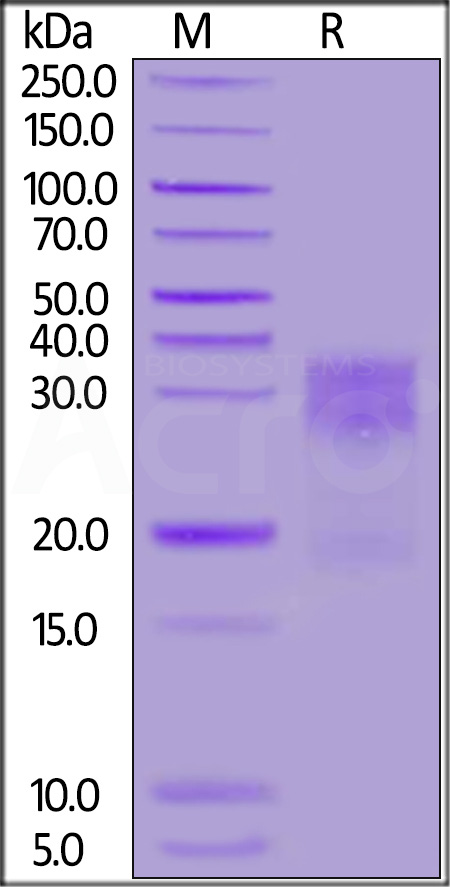分子别名(Synonym)
Mucin-17,MUC-17,MUC17,MUC-3,MUC3
表达区间及表达系统(Source)
Human MUC-17, His Tag (MU7-H52H3) is expressed from human 293 cells (HEK293). It contains AA Arg 4131 - Leu 4390 (Accession # Q685J3-1).
Predicted N-terminus: Arg 4131 & 4244 Ser
Request for sequence
蛋白结构(Molecular Characterization)

This protein carries a polyhistidine tag at the C-terminus. This protein was cleaved within the SEA domain between 4243 Gly and 4244 Ser, and was cleaved into N and C-terminal fragment with calculated MW of 12.6 kDa and 18.6 kDa respectively. The protein migrates as 20 kDa and 25-35 kDa under reducing (R) condition (SDS-PAGE) due to glycosylation.
内毒素(Endotoxin)
Less than 1.0 EU per μg by the LAL method.
纯度(Purity)
>90% as determined by SDS-PAGE.
制剂(Formulation)
Lyophilized from 0.22 μm filtered solution in PBS, pH7.4. Normally trehalose is added as protectant before lyophilization.
Contact us for customized product form or formulation.
重构方法(Reconstitution)
Please see Certificate of Analysis for specific instructions.
For best performance, we strongly recommend you to follow the reconstitution protocol provided in the CoA.
存储(Storage)
For long term storage, the product should be stored at lyophilized state at -20°C or lower.
Please avoid repeated freeze-thaw cycles.
This product is stable after storage at:
- -20°C to -70°C for 12 months in lyophilized state;
- -70°C for 3 months under sterile conditions after reconstitution.
质量管理控制体系(QMS)
电泳(SDS-PAGE)

Human MUC-17, His Tag on SDS-PAGE under reducing (R) condition. The gel was stained with Coomassie Blue. The purity of the protein is greater than 90%.
背景(Background)
Membrane mucins have several functions in epithelial cells including cytoprotection, extravasation during metastases, maintenance of luminal structure, and signal transduction. MUC17, contains an extended, repetitive extracellular glycosylation domain and a carboxyl terminus with two EGF-like domains, a SEA module domain, a transmembrane domain, and a cytoplasmic domain with potential serine and tyrosine phosphorylation sites. Interacts via its C-terminus with PDZK1 and this interaction appears important for proper localization. Probably plays a role in maintaining homeostasis on mucosal surfaces.























































 膜杰作
膜杰作 Star Staining
Star Staining















